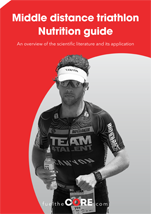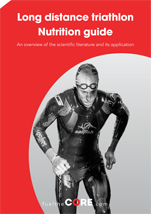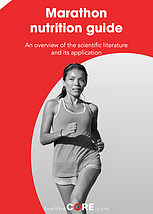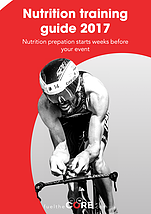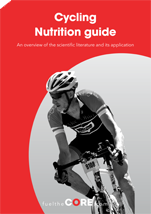Half marathon nutrition guide
An overview of the scientific literature and its application.
For a half marathon or other 1-3h event, nutrition can be an important factor. It is helpful to have a nutrition plan and to be prepared for your race. Many half marathon runners experience problems that are nutrition related and can be prevented easily.
In this article, we will briefly discuss carbo-loading and breakfast, then move onto the nutrition basics, a few general rules of nutrition and some of the most common mistakes.
Carbo-loading
Carbo-loading is a technique that aims to optimize carbohydrate stores often in the days leading up to an event. For a half marathon no extreme carbohydrate loading is required. It is important to go to the start with carbohydrate stores full (and definitely not depleted), but this can be done by eating a normal amount of carbohydrate (The day before a meal that contains pasta, rice, or potato would work well). It is not necessary to eat large amounts. You want to go to the start line nice and light but with enough energy!
Breakfast
Breakfast is probably one of the most important parts of nutritional preparation for a half marathon. Ideally a breakfast is consumed 3-4 hours before the race and contains at least 100 grams of carbohydrate and has a low fiber content (especially for those who often get stomach problems). Good sources of carbohydrate for breakfast, that are very easy to digest, include white bread with jam, bagels, cereals that are low in fiber, and if stomach and intestinal problems are never an issue, oatmeal and muesli. A good breakfast makes sure that carbohydrate is stored in the liver and this will make sure blood sugar does not drop during your half marathon.
The nutritional issues during a half marathon are:
- Running out of Fuel
Hitting the wall, bonking, or just not being able to keep up the intensity during the last part of the race. - Becoming Progressively Dehydrated
Becoming progressively dehydrated to an extent where this will limit performance. This is a problem in hotter races. - Gastrointestinal Problems
Such as stomach cramps, bloating, etc. that can have a negative impact on your performance. This is a common problem and sometimes related to taking in too much nutrition during the run.
Fueling
Your main fuel for an event like this is carbohydrate, especially if you are completing the race under the 2 hour mark. Your body stores contain roughly 500 grams of carbohydrate (this is 2000 kcal) and in theory this should be enough to get you to the finish line. To make sure there is enough energy, it is often recommended to take between 30 and 60 grams of carbohydrate per hour (1, 2). This carbohydrate can be in the form of a bar, a gel, chews, or a drink. If you use solid foods, make sure fat, protein and fiber content are low (no more than a few grams). What foods and which forms you use is entirely up to you and your personal preferences. Faster athletes tend to use more liquids and less solids because it can be difficult to chew at high intensities.
How much is 30 g/h?
To give some idea of what 30 grams per hour equates to, it means that for every hour of the race you would need one of the following combinations:
- 1 gel and a small amount of sports drink.
- 0.5-1 bottle 750 ml of a sports drink.
- 1 energy bar.
For more accurate calculations check the food labels of the products you are going to use for exact amounts.
Hydration
Especially in hot environments dehydration can definitely be a very important factor and can have a devastating effect on performance. During a half marathon drinking to thirst is a recommendation that will work fine for most athletes. However, some athletes want to be a little more prepared and they will work out ow much they will sweat in the conditions of the race and use this to guide their drinking. The aim here should be to prevent a weight loss (sweat loss) of greater than 2% of body weight. For someone who does not sweat much, this may mean they hardly have to drink anything. For a heavy sweater it may require a bit of planning. If you want to find out how to best measure your sweat rate visit Sweat Rater. Don’t drink excessively, and use common sense. You definitely want to avoid weight gain, which clearly would be a sign of drinking too much. Don’t forget that good hydration starts before the race, and hydrate well in the days leading to your race.
Gastrointestinal Issues
A large percentage of athletes, approximately 20 to 50 percent, experience gastrointestinal problems during a half marathon. Some of these problems are very minor but some of these may be so severe that they will affect performance. Some athletes are more prone to develop these problems than others. The complaints may be totally independent of food intake and sometimes they may only happen on race day. This suggests that “race day anxiety” has something to do with it. Studies have also shown that factors like fibre intake, fat intake and the use of very concentrated carbohydrate drinks are causes of gastro-intestinal discomfort (3).
Common mistakes on race day
Sticking to a plan at all cost. If for some unforeseen reason you cannot follow the plan (for example you are developing gastrointestinal problems), do not continue with the plan at all cost. Be flexible and adapt. A slightly lower intake is not going to be a problem, forcing more nutrition in can will.
Trying new things on race day. It is common to see athletes walk around at expos, buying new products for the race the next day. Only use products that you have tried and tested, products you know you tolerate well.
Thinking that more is better. Drinking more, eating more is not always better. Sure, you have to take in enough energy and enough fluids, but once you achieve the basic needs, more is not necessarily better and in some cases detrimental.
So it is important to plan ahead and have a rough idea where you are going to get your carbohydrate from (drinks, gels, bars).
A few extra points
- Sodium losses in a race like this are unlikely to affect performance in the vast majority of athletes (4), so sodium supplementation should not be a priority. Too much might cause gastrointestinal problems.
- Caffeine (low dose: 3 mg/kg one hour before; equivalent of a big cup of coffee or 2 espressos before the start) may help some athletes. Some athletes like it, some don’t.
- Experiment in training and find out what works for you. It is important to train your race nutrition plan in the weeks leading up to your race (8-10 weeks preferred).
These are the very basics of good fueling for a half marathon. Many athletes don’t get the basics right and many athletes are too concerned with other aspects and get distracted by details (such as supplements), without paying enough attention to the basics. Ensure you first have the basis covered.
The next step is that the plan becomes fully personalized, but this is a little more advanced and may require a few measurements.
References
- Jeukendrup, A. E. Nutrition for endurance sports: marathon, triathlon, and road cycling. J Sports Sci 29 Suppl 1: S9199, 2011.
- Jeukendrup, A. (2014). A step towards personalized sports nutrition Sports Med 44 Suppl 1: 2533, 2014.
- Rehrer NJ et al. (1992) Gastrointestinal complaints in relation to dietary intake in triathletes. Int J Sport Nutr. 2(1):4859.
- Baker LB, Jeukendrup AE. (2014) Optimal composition of fluid replacement beverages. Comprehensive Physiology. 4(2):575620.
Author
Professor Asker Jeukendrup is a leading sports nutritionists and exercise physiologist who spent most of his career at the University of Birmingham (UK) and currently he is a visiting professor at Loughborough University. During his career Professor Jeukendrup authored over 200 research papers and book chapters...
